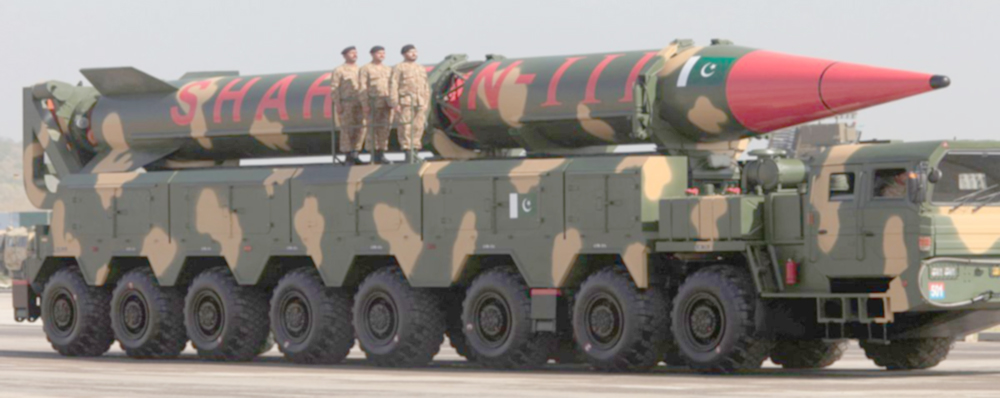By Atia Ali Kazmi
Numerous external entities frequently keep Pakistan’s N-program under their critical spotlight despite the latter’s exemplary track record. Most recently, a former U.S. National Security Advisor (NSA) raised the bogey of Pakistani nuclear weapons getting into terrorist hands. John Bolton opined in his Washington Post article that ‘the time for equivocating about nuclear-armed, Taliban-friendly Pakistan is over.’ He recommended sanctioning Islamabad and stopping any financial assistance, which is otherwise virtually non-existent.
Referred to as a neocon on steroids in a November 2015 article in The Hill, Mr. Bolton enjoys an interesting line of business. He has been a wrecking ball to arms control treaties and an ardent regime-change campaigner. He advocated the U.S. war on Iraq’s ghost WMDs and urged former President Trump to launch preventive strikes on Iran. Furthermore, the U.S. pullout from the Intermediate-Range Nuclear Forces Treaty, UN Human Rights Council, and defunding of the UN Relief Works Agency go to his ‘credit.’
The current administration in the Oval Office must also stay alert so as not to let a former office-bearer spoil their fresh broth. Once shown the door after only 18-months in the NSA office, Bolton’s friends including India were miffed. During the last Kashmir crisis in Feb 2019, he had encouraged India to go on the offensive. Even though the U.S. has been trying to ride the Indian horse with lance at full tilt against China, Bolton still wants to ‘accelerate the tilt towards India.’
Bolton’s absurd claims against Pakistan
Although the opinion of the resident of ‘city upon a hill’ more importantly a former NSA carries weight, such statements against Pakistan’s nukes seldom manage winning consideration. However, the preposterous claims require a critical deconstruction as one would otherwise ignore a person who has built a career tilting at the windmills. His first claim that Pakistan has sought strategic depth in Afghanistan is utterly false.
In fact, Pakistan has witnessed a two-front war situation by a single creator. Former U.S. Defense Secretary Hagel said, ‘India used Afghanistan as a second front and has over the years financed problems terrorism for Pakistan on that Afghanistan side of the border….’ President Alvi recently reiterated a long-standing Pakistani contention that ‘India has been using Afghan soil for hybrid warfare against Pakistan.’
The response to his second assertion is that instead of ‘equivocating about nuclear-armed, Taliban-friendly Pakistan,’ sensible world leaders have thanked Islamabad for its role in the safe evacuation of the U.S. and Western troops from Afghanistan. COAS General Bajwa recently reiterated that Pakistan has no favorites in Afghanistan. Taking a leaf from history, former Secretary Clinton recalled that U.S. funding and training of the Afghan ‘mujahedeen’ spawned the Taliban and Al Qaeda; and it is the U.S. that ‘created the problem’ it later fought and lost.
A peaceful, stable, and progressive Afghanistan is in Pakistan’s interest. Had Pakistan terminated its significant role to bring the Taliban to the negotiating table, there would have been a great mess. Thirdly, Pakistan has learned to live with the nuclear spotlight. In Chapter 13 of his memoir of time in the White House, Bolton claims that one of the two ‘real objectives’ of the Trump Administration in Afghanistan was ‘remaining vigilant against the nuclear weapons programs in Iran and Pakistan.’ On the contrary, knowledgeable persons have actually publicly expressed confidence in Pakistan’s nuclear command and control regime.
Criticism on Pakistan’s nuclear security while India goes scot-free?
The claim that a ‘terrorist regime in Islamabad (or even today’s government) would be ready to transfer nuclear capabilities to terrorists…’ dates to the 1990s. Interestingly, Mr. Bolton completely ignored, for reasons unknown, the real nuclear dangers posed by the religious fundamentalist regime in India that is charged with the management of a huge nuclear arsenal.
Not a single eyebrow has been raised on three recent incidents of nuclear materials smuggling in India. These trafficking incidents indicate the existence of a nuclear black market operating from India. Each aspect of Pakistan’s nuclear security and safety is commendable. The International Atomic Energy Agency has endorsed the practices of the Pakistan Centre of Excellence for Nuclear Security and PCENS is used as IAEA’s training institution. Likewise, international NGOs rate the security of nuclear weapons in Pakistan as high. Pakistan’s weapons remain a credible and effective deterrent against any aggression and are under the highest levels of security and safety. Nuclear security and safety are a national responsibility and a journey, not a destination. Pakistan remains fully cognizant of its responsibility. Any critic must first take the beam out of his own eye to clearly see and remove the speck from that of Pakistan.
Dr. Atia Ali Kazmi is a Senior Policy Analyst at NUST Institute of Policy Studies, Islamabad. The views expressed in the article are the author’s own and do not necessarily reflect the editorial policy of Global Village Space.


